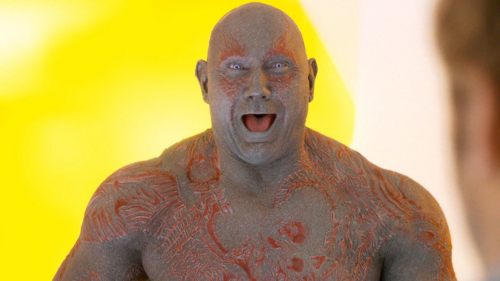STUBER Review: Stupor Is More Like It
When are Hollywood filmmakers going to learn how to properly present Iko Uwais’ fight scenes? The guy very clearly knows his way around a martial-arts brawl, and yet instead of letting the camera properly capture his moves, the makers of both Mile 22 and now Stuber have insisted on shooting him with a hyperactive shaky-cam and cutting his action to bits. That’s what you do with an actor who doesn’t know how to fight, not one as literally kick-ass as Uwais.
The inability to properly showcase Uwais’ physical chops in Stuber is especially inexplicable because they sure didn’t hire him for his acting skills—and that’s not a knock on Uwais, but on the utterly sketchy character he’s given to play. It’s often said that a thriller, even a comedic one, is only as good as its villain. Uwais’ Teijo is not a good villain, and Stuber is not a good movie.
It’s another Mismatched Buddy Action-Comedy, hard-R division, which means lots of swearing and gore in a film that bids to have a soft center at the same time. It also takes a rather contrived route to get its mismatched duo together. Kumail Nanjiani is Stu, a dweeby sporting-goods store worker supplementing his income by driving for Uber (hence the title!). Dave Bautista is Vic, a musclebound cop with a bad attitude who’s determined to take down drug lord Teijo—particularly after an attempt by Vic and his partner (Bautista’s Guardians of the Galaxy co-star Karen Gillan) to apprehend him goes very badly. Wouldn’t you know it, Vic gets a hot tip on Teijo’s whereabouts on the day he’s had Lasik surgery, and since he can’t see well enough to drive, he calls for a ride-share, and guess who shows up? And can you guess that their shared odyssey through assorted crime scenes and confrontations will make Stu more of a man, and Vic a better and more sensitive one?
The writer of record is Tripper Clancy, but the bulk of Stuber could have been the work of a Save the Cat scripting program, with spaces left for the leads to improv. The latter is the movie’s saving grace, as Nanjiani and Bautista have the right comic chemistry and the duo have scattered moments that are genuinely amusing, as when Stu takes an unorthodox but effective approach to interrogating a suspect. The problem is that Stu’s overall arc to becoming more assertive doesn’t take because in one scene he’s a whining wimp, in the next he’s finding his inner bad-ass, and in the next he’s back to wimpery again. A similar inconsistency afflicts Vic, whose vision is impaired by the Lasik except for the scenes where it isn’t.
This still wouldn’t be so much of an issue if more of the material were funnier, but too often Stuber settles for profane and scatological talk over comic inspiration, and the comedy sometimes sits uneasily alongside the graphic mayhem. Director Michael Dowse, based on his raucously violent Seann William Scott hockey opus Goon, was theoretically the right filmmaker for the job, yet the mix is more unstable this time, the brutality coming off as queasy rather than punctuating the humor. The movie fails to take proper advantage of a few inspired setups (like setting an action setpiece in a sriracha factory), and the disclosure of a surprise villain is handled in a pretty soft manner when a later, more potent scene would have been a much better reveal point. And again, Teijo is a thoroughly banal villain, given no interesting backgrounding or details. All you have to do is look back at the seminal buddy-action movie 48 HRS., and how well it establishes James Remar’s memorable Albert Ganz, to see what’s lacking here.
Stuber also doesn’t do terribly well by its female characters. As Vic’s police captain, Mira Sorvino deserves better for her first studio film in a while than the generic role she’s given; as Vic’s neglected daughter Nicole, Natalie Morales brings charm to a part that is essentially a plot device. Similarly, Betty Gilpin, as Stu’s platonic pal/potential business partner Becca, whom he secretly pines for, creates a character in her brief scenes who really does seem right for Stu, yet she’s awkwardly removed from the picture in the service of a predictable final-scene story turn. “Surprised?” someone says when this moment arrives. By that point in Stuber I couldn’t help blurting out, “Not really.”



